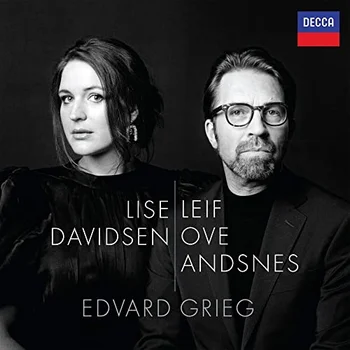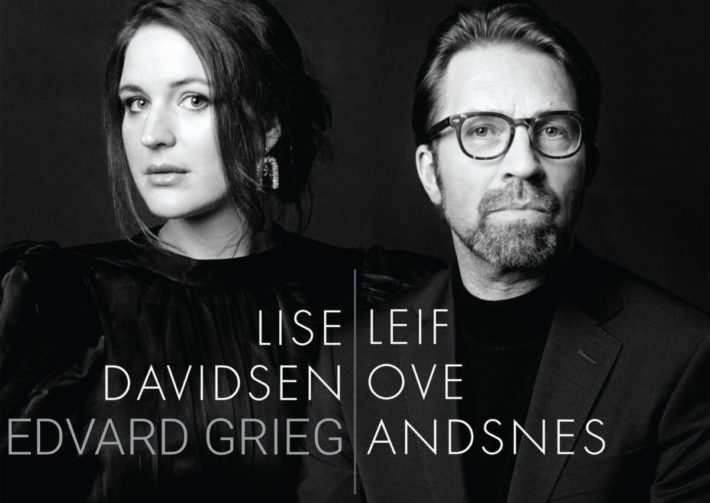Soprano Lise Davidsen’s first collaboration with Leif Ove Andsnes on the songs of Edvard Grieg is not without some high stakes: “Everyone in Norway knows this music,” she says, and adds that there are certain “‘conventions'” about how the works ought to be presented. And so, the duo sees this album as a chance, perhaps even a quest, to find their unique voice.

Haugtussa (The Mountain Maid), is Grieg’s only song cycle. Based on text by Norwegian writer Arne Garbourg, it incorporates a love story with images of nature. (One might in fact draw a connection to Schubert‘s Die Schöne Müllerin, as the protagonist in Haugtussa also faces a lover’s deception and, in the final song, seeks solace beside a brook.) The composer creates a vivid narrative by giving a distinctive character to each song–something the duo emphasizes in their performance. Killlingdans (Kid’s Dance, track 6), opens with the pianist’s sprightly skipping rhythms; the soprano carries the energy forward with her crisp diction that also mimics a childlike innocence. Midway in each stanza, however, the duo makes some lovely momentary shifts into something more dreamy and even wistful.
In Vong Dag (Unhappy Day, track 7), the lover deserts the protagonist. Davidsen makes some skillful adjustments to her timbre to reflect the somber mood: the bright tone heard prior is now velvety, complementing the well-controlled sostenuto. The high points, too, are nicely done, fraught with a moving angst. With the relatively sparse accompaniment, Andsnes takes a step back–a wise choice that lets the singer shine.
The Op. 25 Six Poems are again scenic portraits. We can hear influences from Schubert and Schumann in Med en Vandlilje (With a Water-lily, track 10), especially in the texture of the piano part, which resembles gushing water. The chromaticism, of course, is what sets it apart and is a clever musical nod to the slightly dark undertones of Henrik Ibsen’s poem. Davidsen’s pitch placements are pristine, while Andsnes is seamlessly synchronized to the ebb and flow of the vocal line.
Jeg elsker dig (I Love but Thee, track 13), with text by Hans Christian Andersen, comes from a much earlier set written when Grieg was in his early 20s. It is a selection that Davidsen says is “essential…of any Grieg recital”: despite being a shorter song, it features some beautiful Romantic harmonies and lyricism. I found the duo’s performance here especially lovely. Small amounts of rubato create fluidity; the soprano sings with an earnest passion, while the pianist invites us in with a warm tone. Davidsen’s take brings out a youthful optimism, which makes for an interesting comparison with Kirsten Flagstad’s 1970s performance (Decca). Flagstad, with her expansive, Wagnerian voice, unearths a perhaps surprising but equally effective sense of nostalgia.
The Op. 59 Five Poems, according to the notes, are not often featured fare, which is a real shame given the fine music–this is some of the darkest writing of Grieg’s. Ved Moders Grav (At Mother’s Grave, track 18) features a thicker-than-usual accompaniment which Andnes infuses with dignity and poignancy. Meanwhile, Davidsen shows her true versatility, embodying qualities of both a mezzo and a soprano. The contrast they create between the middle and outer selections is quite effective: the climax, with its dissonance, sounds nearly cataclysmic.
The liner notes are a little unbalanced and too short, with the lion’s share going to Haugtussa where there could have been more said about the other songs. There are bits of Davidsen’s reflection interspersed throughout–while insightful, they might leave more impact if better organized. The inclusion of the song’ texts and translations, however, are a most welcome addition that helps better appreciate the connection between text and music. As for the sound engineering, it gives both the voice and piano appropriately balanced exposure–even in the more minimal accompanimental material, for instance, we can still hear Andnes’ finessed tone quality.
The selections are well-chosen in how they reveal the many aspects and nuances of Grieg’s in a genre of his we don’t always pay enough attention to. The performers certainly adjust comfortably and organically to each song. A fine debut collaboration indeed. Warmly recommended.
Recommended Comparisons
Flagstad | von Otter | Järvi | Lupu
Edvard Grieg
Lise Davidsen – Soprano
Leif Ove Andsnes – Piano
Decca Classics, CD 4852254



















